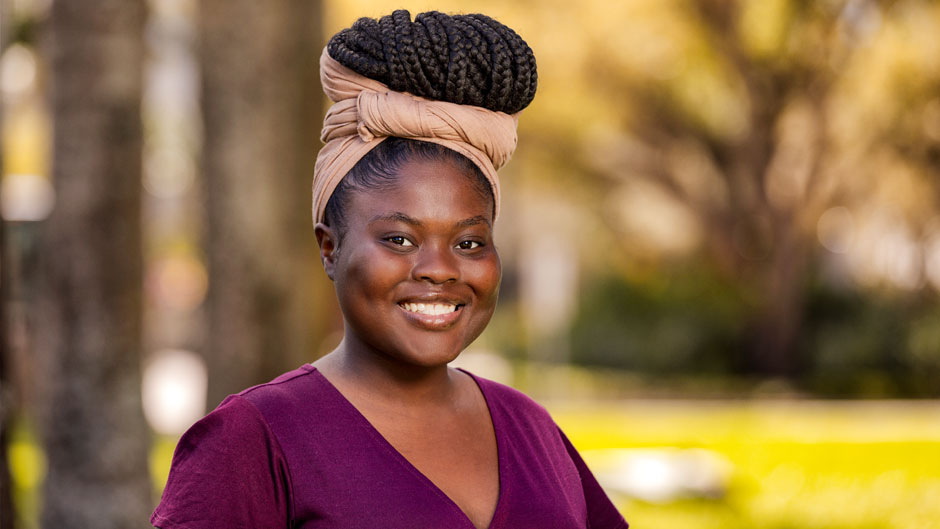Growing up as the daughter of Haitian parents, Esther Alexandre was surrounded by a culture that expected girls to grow up and become nurses or teachers and, if not, become homemakers.
Alexandre decided to change the narrative and is now studying computer engineering at the University of Miami. She was intrigued about what determined how young women pursued a career in the STEM field.
As part of her work as a 2021-2022 Adobe Research Scholar working with the guidance of Ava Brillat, program lead for information literacy and instructional design, and Vanessa Rodriguez, head of the Creative Studio, as well as other librarians at the Otto G. Richter Library, Alexandre created a documentary in which she interviewed dozens of students.
Most of the students in the documentary, “Pipeline of Women in Stem,” were at the University of Miami. She also talked off camera to many young students from Ruben Dario Middle School in Miami.
: “As I look back, I can see the fractures of where I could have gone through a different pathway. Fractures such as education curriculum, social and economic, and my heritage,” Alexandre wrote in the introduction to her film. “I realize how important it is at a young age to be exposed to not only the typical job careers but the ones that are slightly harder paths and mostly dominated by men,” she added.
A junior, Alexandre was one of two 2021-2022 Adobe Library Research Scholars who presented their projects during an online event on May 3. The other Adobe scholar was Alison McWalters, also a junior, who is studying advertising and classics. Her audiovisual project focused on portrayals of mythical women in contemporary media.
Alexandre pointed out that she could have easily taken a different career path.
“I grew up in an urban neighborhood where the basic curriculum was basic math, science, and language arts and I realized that it did not stimulate any creativity or any innovation,” she said. “I see a lot of women who are being lost in the cracks and they could be cultivated into being the next innovators, scientists, and mathematicians.”
Alexandre said that society and social and popular media tend to pigeonhole women into certain careers. A dearth of female role models also can play a role into why women may shy away from STEM jobs.
“In science and history classes we are taught about scientists such as Newton, Einstein, and Edison,” she narrates in the documentary. “Yet in our curriculum there is no mention of Ada Loveless who is the first computer programmer, or Emmy Noether, who is regarded as one of the most important mathematicians of the 20th century.”
In her film, Alexandre interviewed many University students in the STEM fields with varied backgrounds. However, most of those who were exposed to science or engineering programs early on in their education, persevered and saw themselves in those fields.
When Alexandre spoke to some Ruben Dario Middle School students about their career aspirations, many said they wanted to be rappers or influencers.
“When I said I was from the University of Miami, they said ‘Wow, I could never get myself there’ and they were counting themselves out of getting into college,” she said.
Alexandre said that she believes that one way to encourage students to aspire to any college or career is to expose them to different role models who have achieved challenging roles. “It would inspire students to actually want to learn in new ways,” she said.
Three Library Research Scholars also presented their projects during the session.
Nathaly Gonzalez, a senior studying psychology and French, highlighted “Oiga, Mire, Vea: Salsa and the Colombian Armed Conflict” in her academic paper. She explored the ways in which personal and collective accounts of trauma are transmitted and adapted via salsa, the most popular and emblematic musical style of Cali, Colombia.
Sakina Qazi, a junior who is studying biochemistry and English literature, discussed her project proposal—a research paper that is an investigative review on the overlap of medicine and literary works throughout history.
Bhavjeet Sanghera, a sophomore studying neuroscience, presented on an interactive visualization in ArcGIS—a web-based mapping software—that focuses on the opioid crisis in Florida.
The Adobe Library Research Scholars Program was inaugurated in 2018 and was built on the success of the preexisting research program. Through an endowment provided by Adobe Systems Inc., two undergraduate students are selected each year to serve as Adobe Scholars, along with three Library Research Scholars. Find out more about the programs and how to apply.
Each student who is accepted into one of the research programs will participate in a yearlong, four-part program that includes mentorship.

